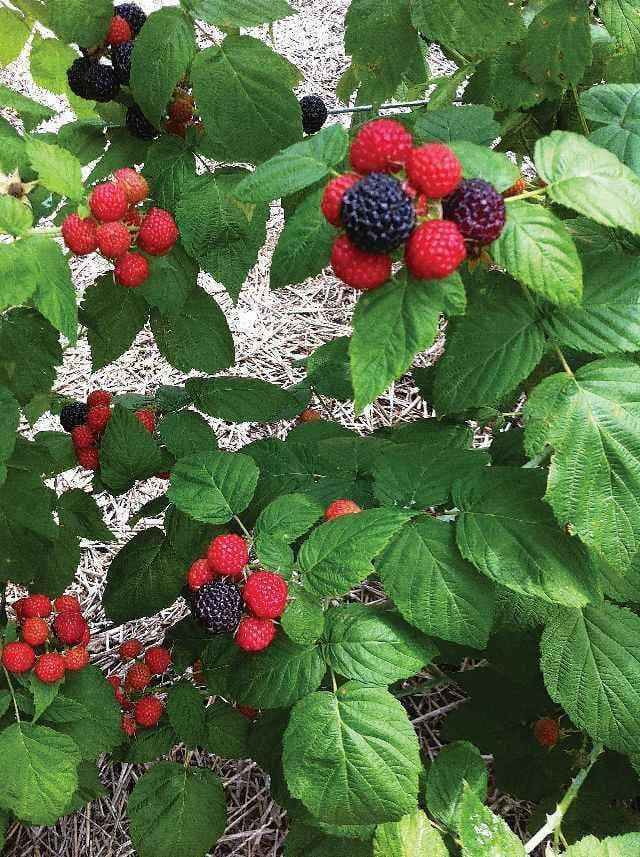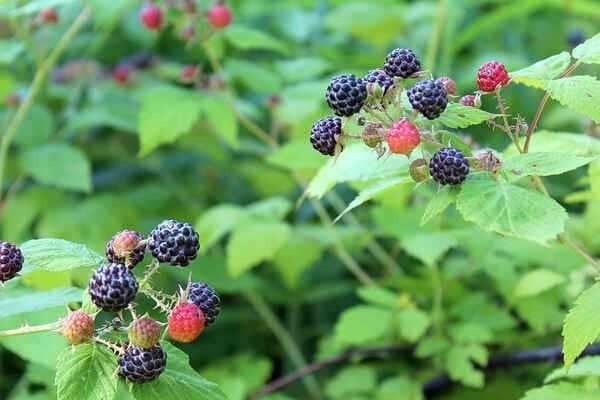



Black Raspberry
We sell bare root plants - click here to see what you'll receive
Black Raspberry: Rubus Occidentalis
The Black Raspberry plant has dark berries and distinctive foliage that provide a visually striking contrast to other plants, enhancing the overall aesthetics of the landscape. Rubus occidentalis offer a variety of benefits when integrated into landscaping projects. These versatile plants blend aesthetic appeal, ecological contributions, and practical uses in outdoor spaces.
Known as and more famously called the “king of berries,” are sweet and highly nutritious berries native to North America. Famous for their intense sweet, tart taste, high nutritional value, and dark hue, these berries are a separate kind in the group of raspberries.
Interestingly, the plants contain higher antioxidants, including anthocyanins and other elements that make them suitable for health. Apart from their use in food preparation, they are valued by gardeners because they are easily manageable and ornamental, and they are ideal for planting in both domestic and commercial landscapes.
Features of Black Raspberry
Compared to other berries, they possess a slightly sour taste. Their firm but fleshy appearance makes them suitable for fresh consumption and preparing jams, jellies, desserts, and smoothies.
They are high in antioxidants, dietary fiber, vitamins C and K, and minerals such as manganese. The plants are attractive, with green leaves that turn red in the fall. For this reason, they are perfect for growing in any garden or landscape setting.
Black Raspberry Growth
These plants grow to 3 to 5 feet and are not very difficult to tame. They prefer well-drained soil and moderate watering, making them suitable for planting in different regions.
These plants are also prolific, yielding berries from mid-summer to early fall. This makes them a worthwhile pursuit for home gardening enthusiasts and commercial growers.
They are for sale at TN Nursery are available for those who wish to grow these nutritious berries in their gardens. Buy them now and experience the many benefits they offer regarding gardening and consumption.
Enjoy Harvesting Berries
For a better experience, you can pair these plants with our top 3 other best sellers, including Dewberry plants, Elderberry Bush, and Mulberry Trees, to turn your garden into a mini farmer’s market.
Are they a perennial or annual?
They are perennial and thus grow back every year from their roots. While their canes only have a life span of two years, the roots still grow and sprout new canes each year.
Where do they grow best
They need well-draining soil exposed to direct sunlight. They love slightly acidic soil with a pH range of 5.5 - 6.5 and a hardiness zone of 4-8.
How long do they last?
In the first year, plants are wilted; in the second year, plants will probably produce berries. Fruiting time is about 2-4 weeks, and flowering is late spring-early summer, partially dependent on climate.
What is the best fertilizer for them?
They are like a balanced fertilizer, with a 10-10-10 NPK. Use it during the first half of the early spring when the plants emerge from their sleep. Don't use too much of it (it is on the packet).
How do They propagate?
Black raspberries reproduce through tip layering. Some of their tips turn into canes on the ground and grow into new plants. You can also propagate them by yourself with the use of cane tips that should be planted in the soil during the summer or early fall.
| Planting zone | [5, 6, 7, 8] |
|---|---|
| Bloom season | Spring |
| Bloom color | White |
| Height At Maturity | Under 10 Feet |






Black Raspberry
| Planting zone | [5, 6, 7, 8] |
|---|---|
| Bloom season | Spring |
| Bloom color | White |
| Height At Maturity | Under 10 Feet |

